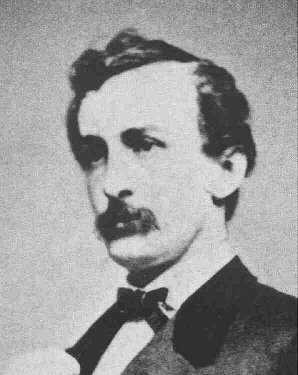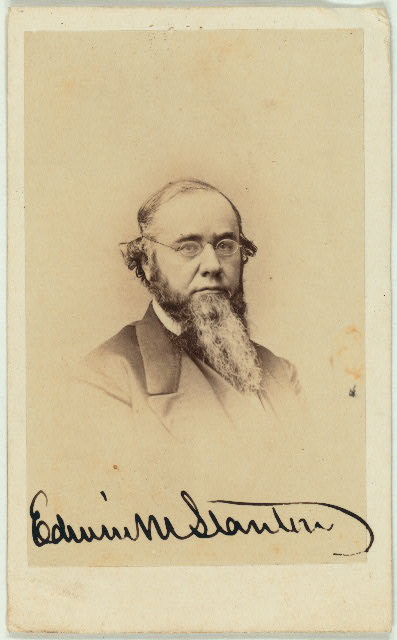
One of the most common theories is that Lincoln was the victim of a Confederate plot. This theory arose before Lincoln had even died, and it was supported by coded letters found in John Wilkes Booth's room which tied him to the Confederacy. Additional circumstantial evidence indicated that Booth had spent nearly two weeks in Montreal in late October, 1864, a haven for Confederate loyalists. There, Booth lived on what many believe was support from Confederate officials.
 Booth, the accused murderer of Lincoln
Booth, the accused murderer of LincolnA shadowy figure lends credence to this theory. A young Confederate agent known as "Mrs. Slater" was implicated by several witnesses, and an effort was initiated to find her. Believed to be Sarah Gilbert, a native of Connecticut who had moved to North Carolina, Mrs. Slater is known to have visited the Surratt House often during the assassination planning and she was a known friend of several of the conspirators. She also made several trips to Canada in the months preceding the assassination. She has never been found.
Lincoln was considered a legitimate war target, especially after the ill fated raid on Richmond by Ulrich Dahlgren and Judson Kilpatrick. Dahlgren had been killed in the raid, and papers found on his body purported to state one of the objectives of the raid to be the assassination of Jefferson Davis. Though the United States claimed the papers were forgeries, many held Lincoln accountable, saying he ordered the raid and approved the objectives. Some go so far as to specifically accuse Confederate Secretary of State Judah Benjamin as the mastermind behind the plot, pointing out that Benjamin burned all his papers before leaving Richmond, fled to England, and became the only Confederate official never to return to the United States.
Judah P. Benjamin, Confederate Secretary of State 
Another commonly held theory was that Vice-President Andrew Johnson had something to do with Lincoln's death. Some hold that Johnson and John Wilkes Booth were acquaintances, and possibly old friends from their days in Tennessee when both kept mistresses who were sisters. Mary Todd Lincoln herself believed this theory, as did several members of Congress. A special Assassination Committee was appointed to investigate, but no evidence was uncovered which tied Johnson into any plot.
 Andrew Johnson
Andrew Johnson
A third conspiracy theory blames powerful international bankers, with Booth simply being the hired gun. This theory believes that Lincoln had been offered large sums of money in the form of loans, to offset the costs of conducting the war. Lincoln supposedly turned to other sources, alienating the bankers. He further turned them against him with his generous Reconstruction plans which would have allowed the South to resume an agricultural way of life. The bankers, the theory says, preferred a harder policy toward the South which would have produced higher prices on several commodities, bringing the bankers huge profits. Subscribers to this theory believe the bankers saw Lincoln as a threat to their speculative ways, and needed him out of the picture.
Theory number 4 implicates the Roman Catholic Church. There are several variations on this theme. One author speculated as recently as 1963 that the church had actually been responsible for removing several heads of state from office through the centuries when their philosophies conflicted. This theorist says that most American Catholics favored slavery in 1860, and thus opposed Lincoln. As a result, the Vatican considered Lincoln an enemy to be eliminated.
Another theory implicating both the Catholic Church and Confederate officials involves an ex-priest named Charles Chiniquy, who stated in 1883 that Jefferson Davis had offered $1,000,000 to anyone who killed Lincoln. Davis offered the money and the Church was to select and train the assassins, who would receive glory in Heaven. Booth supposedly was the chosen assassin. Lincoln had defended Chiniquy in an 1856 court case and had arranged for a settlement. Chiniquy saw this as a victory over the Church and believed they held Lincoln responsible and thus were more than willing to accept Davis's offer.
Secretary of War Edwin Stanton is named in still another theory. Those who believe Stanton was responsible hold that the Secretary of State favored a harsher Reconstruction policy. They point out that Stanton had convinced Ulysses Grant not to go to the theater with Lincoln, leaving the President more vulnerable. They also say that Stanton knew Booth and his compatriots had been planning to kill Lincoln but he told nobody. The chief source of this theory was Otto Eisenschiml, who published a book in 1937 outlining his idea. Eisenschiml followed a series of coincidences and tried to tie them to Stanton through what most historians view as shoddy research. Still, there are many who believed him even though much of the evidence has been shown to have been fabricated.
 Edwin Stanton
Edwin Stanton Which of these theories is true? There is much evidence to support at least two of them, including the most commonly believed theory which holds Booth and his conspirators responsible. While the evidence is there, it is open to interpretation, which in turn leads to speculation, which often is poisoned by preconceived ideas. The result is that most of us probably already believe one of the theories and will continue to do so, at least until more substantial evidence comes along.
